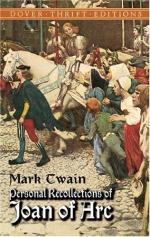At first when the Paladin heard us tell about the glories of the Royal Audience he was broken-hearted because he was not taken with us to it; next, his talk was full of what he would have done if he had been there; and within two days he was telling what he did do when he was there. His mill was fairly started, now, and could be trusted to take care of its affair. Within three nights afterward all his battles were taking a rest, for already his worshipers in the tap-room were so infatuated with the great tale of the Royal Audience that they would have nothing else, and so besotted with it were they that they would have cried if they could not have gotten it.
Noel Rainguesson hid himself and heard it, and came and told me, and after that we went together to listen, bribing the inn hostess to let us have her little private parlor, where we could stand at the wickets in the door and see and hear.
The tap-room was large, yet had a snug and cozy look, with its inviting little tables and chairs scattered irregularly over its red brick floor, and its great fire flaming and crackling in the wide chimney. It was a comfortable place to be in on such chilly and blustering March nights as these, and a goodly company had taken shelter there, and were sipping their wine in contentment and gossiping one with another in a neighborly way while they waited for the historian. The host, the hostess, and their pretty daughter were flying here and there and yonder among the tables and doing their best to keep up with the orders. The room was about forty feet square, and a space or aisle down the center of it had been kept vacant and reserved for the Paladin’s needs. At the end of it was a platform ten or twelve feet wide, with a big chair and a small table on it, and three steps leading up to it.
Among the wine-sippers were many familiar faces: the cobbler, the farrier, the blacksmith, the wheelwright, the armorer, the maltster, the weaver, the backer, the miller’s man with his dusty coat, and so on; and conscious and important, as a matter of course, was the barber-surgeon, for he is that in all villages. As he has to pull everybody’s teeth and purge and bleed all the grown people once a month to keep their health sound, he knows everybody, and by constant contact with all sorts of folk becomes a master of etiquette and manners and a conversationalist of large facility. There were plenty of carriers, drovers, and their sort, and journeymen artisans.




